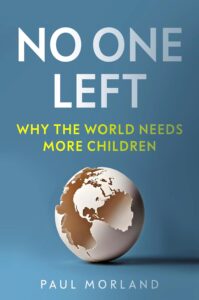When I wrote “Is Gender Too Troubled?” I was chasing down the answer to a question that had long been bothering me: should we continue to use the term “gender,” given its increasingly incoherent meanings? I started with that question, unsure where I would end up.
Writing the piece was like walking down a hallway and rattling different doorknobs to see what might open—and I had some fun while doing it, reveling a bit in the sheer linguistic absurdity that “gender” has wrought. I’m grateful to Alex for engaging with the piece, because it’s allowing me to think back through my own thoughts, to rattle some more doorknobs.
I now find myself chasing the answer to a different question: is it time to ditch the sex/gender distinction altogether?
I will circle back to that question, but let me begin by responding to Alex’s piece with two clarifications and a concession.
First, the “four genders” muck-up (I’m tempted to use a more alliterative phrase here, but I’ll behave myself). The idea that there are four genders has never crossed my mind, so I was surprised to see this position attributed to me when I read a draft of Alex’s critique. After some back and forth with Alex, I understood the source of the confusion. Woe unto you who tries to sneak an imprecise analogy past a philosopher! Indeed, I should have framed my SAT prompt thus: gender is to woman (or girl) as sex is to female.
In my view, as stated in the original piece, gender is grounded in generative potential. I use the phrase “potential” in a precise Aristotelian-Thomistic sense, as an innate power or potency that exists within something whether or not that potency is ever fully actualized. Everything has a range of innate potencies that characterize its particular nature. A rock has the potential to fall to the ground; it does not have the power of voluntary locomotion. A cat has the power to move itself from place to place; it does not have the power to learn how to read. Humans do have the potential to develop literacy, but efforts to actualize that potential, e.g. through formal education, would not work on cats or rocks, because cats and rocks lack that potency by nature.
Let’s apply this concept to gender. A woman is a human being who has the innate potential to gestate offspring, to generate within herself. A man is a human being who has the innate potential to inseminate, to generate outside of himself. This potentiality inheres in the overall structure of the body as a whole, and is thus present even across different stages of development or conditions wherein the potential cannot be actualized. The concept of “infertility,” in fact, depends upon these categories of potentiality and actuality. A man who cannot gestate is not considered infertile, because he does not have that inherent potential. The word “infertile,” then, signals an inherent potential that cannot be actualized. In my proposed view, a girl and woman share the same generative potential and thus the same gender. That is the first clarification: there are two genders, because in human beings, there are two modes of generativity, i.e. two sexes.
What, then, is the difference between sex and gender, if by defining gender I refer back to sex qua generative potential? In the original piece, the distinction I proposed was that “gender” could capture the added dimension of human. Indeed, there is a difference between “female” and “woman” (or girl!) in that women and girls are human females. From the human dimension arises additional complexity in terms of interiority (self-consciousness, moral agency) and exteriority (cultural embeddedness, social mimesis)—which makes gender arguably “thicker” in humans than other animals.
The gender subjectivist, who sees gender as a subjective sense of self, tries to get at this interior complexity, while the gender constructionist, a la early Judith Butler, locates “gender” in the external social forces that shape us. Despite grasping at partial truths, both views err in absolutizing these respective aspects of gender and uprooting them from the ground of sex. In that essay, I wondered whether gender could serve as a name for human sexuateness, capturing these various dimensions of human personhood while presenting them as an integrated whole, grounded in bodily sex. In this view, humans would have gender, but mole rats, for example, would not.
This brings me to my second clarification. Alex sees this framing as “something of a retreat to (early) Butler.” On this point he’s incorrect, because early Butler claims that sex is an effect of the social construction of gender. In Butler’s view, both “woman” and “female” are constructs. Butler wants to collapse sex into gender, wherein both are social constructs; she does conflate them, but in the opposite direction. I want to reintegrate gender with sex, taking sex to be a stable, objective biological reality upon which the existence of our species depends—decidedly not a mere construct.
What Alex is picking up on, however, is my impulse to retain some kind of sex/gender distinction, to retreat to a semblance of that classic feminist framing. While I argued in that piece for a strategic conflation of gender and sex in most contexts, the step I didn’t take was losing a conceptual distinction between sex and gender altogether. It is this impulse that his critique is leading me to question.
This brings me to the concession: Alex contends that “Favale’s proposal inevitably introduces an unwelcome ambiguity,” and he questions the merits of “introducing yet another meaning of ‘gender.’” I think he’s probably right. I wonder if I’m trying to have my cake whilst eating it—retaining the sex/gender distinction yet, at least in practice, discarding it.
The sex/gender distinction originated as a way to guard against an overly enthusiastic biological determinism. The second-wave feminists who first employed it were trying to make a reasonable distinction between the stable biological reality of sex and the various cultural interpretations of that reality, which should not be read as strictly natural or inevitable. But it has been decades since the sex/gender distinction remained within those tidy constraints. In hindsight, after fifty years of its usage, it’s clear that the distinction has ultimately served to diminish the significance of biology and define “woman” and “man” apart from sex altogether. Is there any merit in trying to salvage the sex/gender distinction, given that its overall effect has been to deconstruct sex and reify “gender,” in all its various iterations?
When I ask whether we should ditch the distinction, what I mean is the linguistic framing of that distinction with two separate terms. I do not mean that we should stop distinguishing between biological realities and the cultural interpretations of those realities—this is an important difference to track. But as both Alex and I wrote in our respective pieces, those aspects could be distinguished by phrasing that does not introduce a bifurcation between sex and gender. Does it make sense to keep that bifurcation, no matter how carefully framed, considering that this enabled and now likely prolongs the unmooring of gender from the reality of sexual difference? This is still a live question for me, so I won’t take a definitive stand here. But let’s just say that when I jiggle the eight ball and ask the question—“does the sex-gender distinction do more harm than good?”—this answer floats up: signs point to yes.



